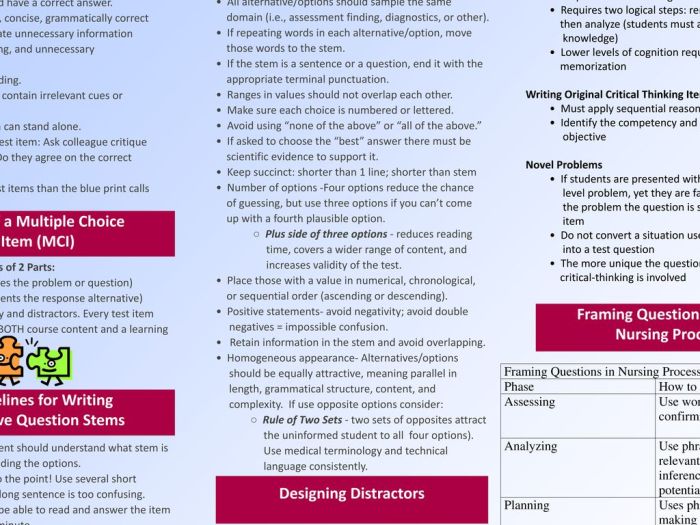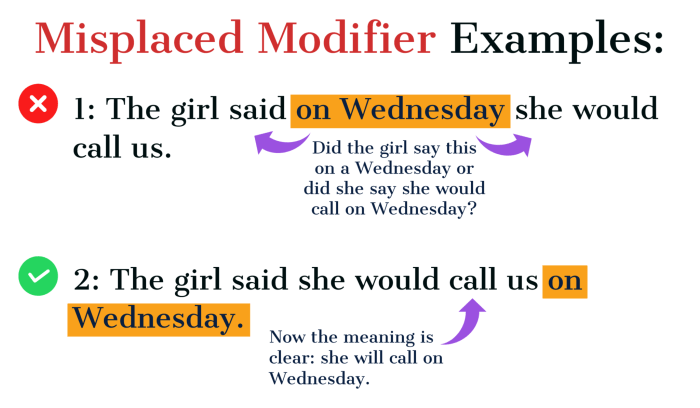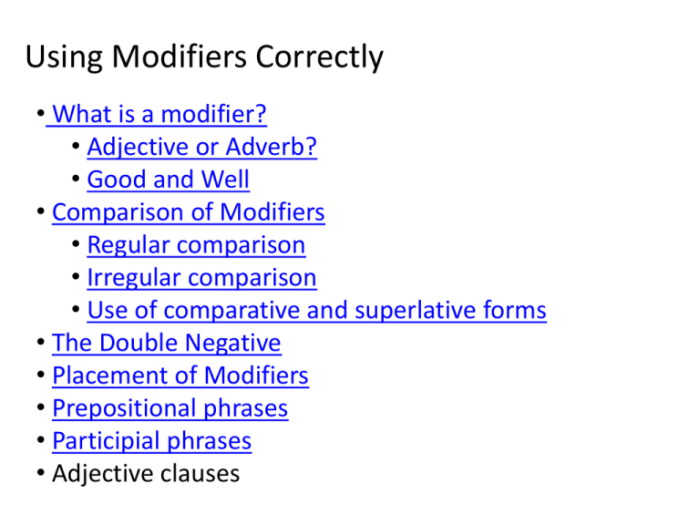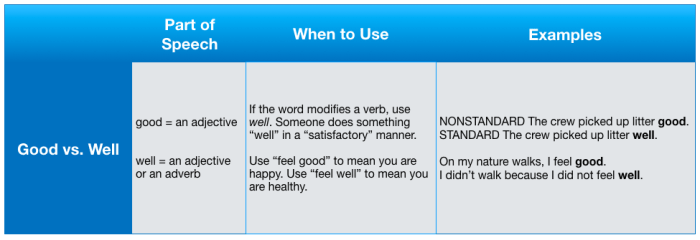In the realm of effective communication, the art of using correct modifiers and concise wording stands as a cornerstone. By skillfully employing modifiers and eliminating unnecessary verbiage, writers can craft prose that is both clear and impactful. This guide delves into the nuances of modifier usage, the importance of conciseness, and their profound impact on writing style, grammar, and reader engagement.
Throughout this comprehensive exploration, we will uncover the secrets of using modifiers to enhance clarity, distinguish between restrictive and nonrestrictive modifiers, and identify techniques for crafting concise sentences that convey meaning without sacrificing precision.
Modifiers: Correct Modifiers And Concise Wording

Modifiers are words, phrases, or clauses that provide additional information about a noun, verb, adjective, or adverb. They help to make writing more concise and clear by providing specific details that enhance the reader’s understanding.
Types of Modifiers
There are two main types of modifiers: restrictive and nonrestrictive.
Restrictive Modifiers
Restrictive modifiers limit or restrict the meaning of the word they modify. They are essential to the meaning of the sentence and cannot be omitted without changing the meaning. Restrictive modifiers are typically placed immediately adjacent to the word they modify.
- Example: The redcar is parked in the driveway.
Nonrestrictive Modifiers
Nonrestrictive modifiers provide additional information about the word they modify, but they do not limit or restrict its meaning. They are not essential to the meaning of the sentence and can be omitted without changing the meaning. Nonrestrictive modifiers are typically set off by commas.
- Example: The car, which is red, is parked in the driveway.
Concise Wording

Concise wording is paramount for effective communication, ensuring clarity, precision, and impact. It involves using the fewest possible words to convey a message without sacrificing meaning or accuracy.
To achieve concise wording, identify and eliminate unnecessary words and phrases. Adverbs and adjectives should be used sparingly, only when they add essential detail. Avoid redundancies, such as “very unique” or “completely finished,” as these phrases are inherently redundant.
Techniques for Identifying Unnecessary Words
- Eliminate empty words:Words like “just,” “basically,” and “really” add no value to the message.
- Use strong verbs:Replace weak verbs with more descriptive and active verbs that convey the action directly.
- Avoid jargon and technical terms:Use language that is accessible to the intended audience.
Examples of Concise Wording
Verbose:“The weather conditions were extremely unfavorable for the outdoor event, necessitating its cancellation.” Concise:“Bad weather forced the cancellation of the outdoor event.”
Verbose:“The report is currently in the process of being finalized and will be available shortly.” Concise:“The report will be available soon.”
Style and Grammar

Correct modifiers and concise wording are essential elements of writing style. They contribute to clarity, precision, and overall readability. Grammar plays a crucial role in ensuring that writing is free from ambiguity and grammatical errors.
Modifiers
Modifiers are words or phrases that provide additional information about a noun, verb, or adjective. Using correct modifiers ensures that the meaning of the sentence is clear and unambiguous. For example, instead of writing “The car was fast,” one could write “The red car was blazingly fast.”
The modifier “blazingly” provides a more specific description of the car’s speed, making the sentence more precise.
Concise Wording
Concise wording involves using the fewest possible words to convey a message effectively. Avoiding unnecessary words and phrases helps to maintain clarity and focus. For example, instead of writing “In the event that you have any questions, please do not hesitate to contact us,” one could write “If you have any questions, please contact us.”
The revised sentence is more concise and direct, while still conveying the same meaning.
Grammar
Grammar is the system of rules that govern the structure of language. Correct grammar ensures that writing is clear, unambiguous, and easy to understand. Common grammatical errors that can hinder conciseness include:
- Run-on sentences
- Comma splices
- Dangling modifiers
- Pronoun agreement errors
- Subject-verb agreement errors
By avoiding these errors, writers can ensure that their writing is grammatically correct and easy to read.
Editing and Revision

Editing and revision are essential steps in the writing process that can significantly improve the usage of modifiers and conciseness in your writing. By carefully reviewing your work, you can identify and correct errors, clarify your ideas, and ensure that your writing is clear and effective.
Self-Editing
Self-editing involves critically evaluating your own writing. Start by taking a break from your work and returning to it with fresh eyes. Read your writing aloud to identify awkward phrasing, misplaced modifiers, or unnecessary words. Pay attention to the flow of your sentences and paragraphs, and consider whether you can express your ideas more concisely.
Peer Review
Peer review involves seeking feedback from others on your writing. Ask a friend, colleague, or teacher to review your work and provide constructive criticism. They may be able to identify errors or areas for improvement that you overlooked during self-editing.
Encourage them to focus on the usage of modifiers and conciseness.
Identifying and Correcting Errors, Correct modifiers and concise wording
When editing your writing, pay particular attention to the following:
- Misplaced modifiers:Ensure that modifiers are placed as close as possible to the words they modify to avoid confusion.
- Dangling modifiers:Avoid using modifiers that do not have a clear antecedent in the sentence.
- Unnecessary words:Identify and eliminate unnecessary words or phrases that add clutter to your writing.
Impact and Effectiveness

Correct modifiers and concise wording are essential elements of effective writing. They not only enhance the clarity and comprehension of the text but also significantly impact reader engagement and persuasion.
Clear and concise writing helps readers grasp the intended message quickly and accurately. Precise modifiers provide the necessary context and specificity, preventing ambiguity and ensuring that the meaning is conveyed effectively. By eliminating unnecessary words and phrases, concise wording streamlines the text, making it easier to read and understand.
Enhanced Comprehension
- Improved Clarity:Correct modifiers and concise wording remove ambiguity and vagueness, allowing readers to grasp the intended meaning more easily.
- Reduced Cognitive Load:Concise writing reduces the mental effort required to process information, improving comprehension and retention.
- Increased Focus:By eliminating distractions and focusing on essential information, concise wording helps readers stay engaged and concentrate on the main points.
Increased Persuasion
- Credibility and Trust:Clear and concise writing conveys a sense of professionalism and authority, building trust and credibility with readers.
- Enhanced Clarity:Persuasive writing relies on clarity to present arguments effectively. Correct modifiers and concise wording ensure that the intended message is communicated with precision.
- Emotional Impact:Concise writing can evoke emotions and connect with readers on a deeper level, making the message more persuasive and memorable.
Examples of Effective Writing
Example 1:The concise sentence “The car was red” is more effective than the verbose “The automobile was painted in a crimson hue.” The correct modifier “red” conveys the color precisely, while the concise wording eliminates unnecessary words.
Example 2:A persuasive essay that clearly explains the benefits of a new policy using specific examples and precise modifiers is more likely to convince readers than one that is vague and cluttered with jargon.
Expert Answers
What is the difference between a restrictive and a nonrestrictive modifier?
Restrictive modifiers limit the meaning of a noun or noun phrase, while nonrestrictive modifiers provide additional information that is not essential to the meaning of the noun or noun phrase.
How can I identify unnecessary words and phrases in my writing?
Look for words and phrases that do not add meaning or clarity to your sentences. These may include empty phrases, redundant words, or qualifiers that are not specific enough.
What are some common grammatical errors that can hinder conciseness?
Common grammatical errors that can hinder conciseness include using passive voice, using weak verbs, and using unnecessary conjunctions.